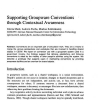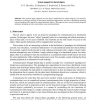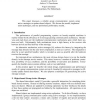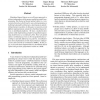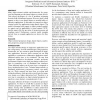122
click to vote
ECSCW
1997
15 years 3 months ago
1997
: Conventions are an important part of articulation work. They are a means to merge the various perspectives and workstyles that are involved in handling shared objects in CSCW. We...
127
click to vote
SIGOPSE
1992
ACM
15 years 5 months ago
1992
ACM
This position paper supports the view that a model based on shared objects is an attractive alternative to message passing for structuring distributed applications and that a distr...
129
click to vote
AICCSA
2001
IEEE
15 years 5 months ago
2001
IEEE
- This paper presents an environment for development of distributed applications. It consists basically of adding to language Java a library of methods to manipulate shared objects...
125
click to vote
SIGOPSE
1994
ACM
15 years 6 months ago
1994
ACM
This paper discusses a reliable group communication system using active messages to update shared objects. We discuss the model, implementation techniques, and our preliminary per...
115
click to vote
UIST
1996
ACM
15 years 6 months ago
1996
ACM
We describe COTERIE, a toolkit that provides languagelevel support for building distributed virtual environments. COTERIE is based on the distributed data-object paradigm for dist...
121
click to vote
CSCW
1996
ACM
15 years 6 months ago
1996
ACM
This paper introduces COAST, an object-oriented toolkit for the development of synchronous groupware, which enhances the usability and simplifies the development of such applicati...
115
click to vote
SPAA
1997
ACM
15 years 6 months ago
1997
ACM
Consider a set of shared objects in a distributed network, where several copies of each object may exist at any given time. To ensure both fast access to the objects as well as e ...
108
click to vote
PODC
1997
ACM
15 years 6 months ago
1997
ACM
Conditions on a shared object type T are given that are both necessary and sufficient for wait-free n-process consensus to be solvable using objects of type T and registers. The co...
101
click to vote
HIPS
1998
IEEE
15 years 6 months ago
1998
IEEE
Distributed shared objects are a well known approach to achieve independenceof the memory model for parallel programming. The illusion of shared (global) objects is a conabstracti...
100
click to vote
GROUP
1999
ACM
15 years 6 months ago
1999
ACM
Many object-oriented toolkits and frameworks for groupware development provide shared objects as a basic service. This relieves developers of a lot of problems originating from th...
